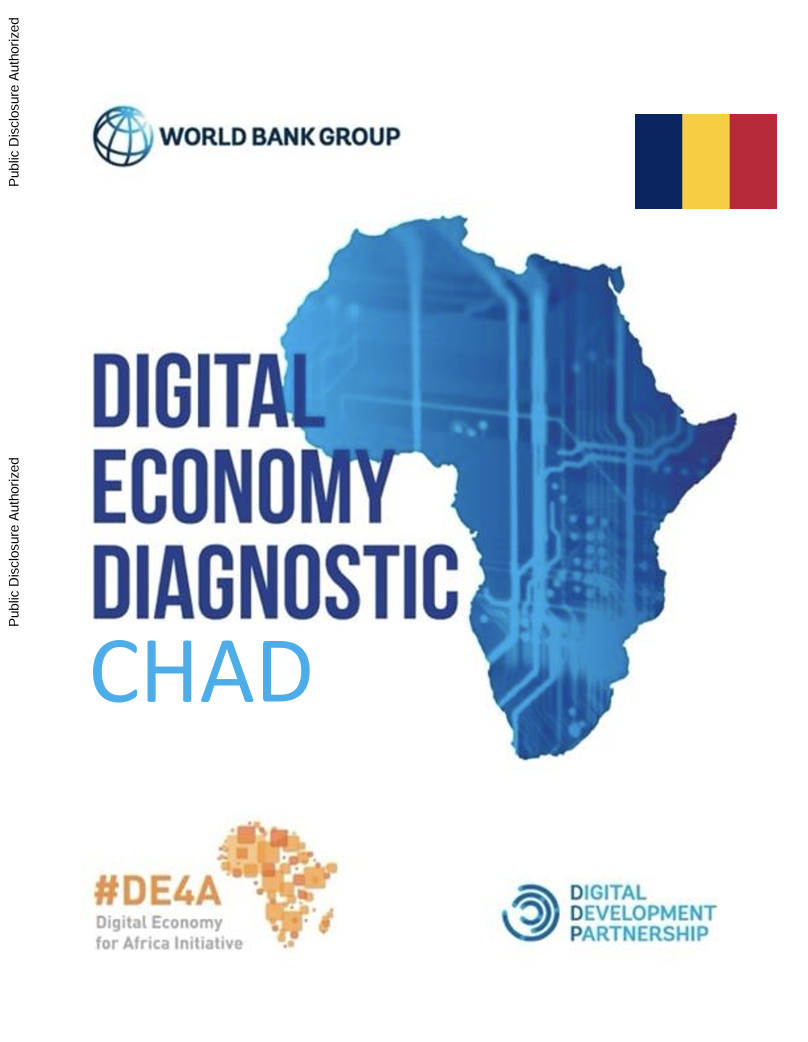
Digital Economy Diagnostic Chad
Author(s)
Abstract
Leveraging the digital economy can be transformational for Sub-Saharan African (SSA) countries. Rapid digital transformation is reshaping the global economy, driving financing inclusion, closing information asymmetry gaps between buyers and sellers, and changing the way economies of scale are achieved. According to research from Google and IFC (2020), Africa’s internet economy is poised to reach US$180 billion by 2025 (compared to US$115 billion in 2020),1 accounting for 5.2 percent of the continent’s GDP. COVID-19 has accelerated the digital transformation, as many countries leveraged digital technologies to ensure business and education continuity, prevent service interruptions, and cope with social distancing. Country-level policies and interventions have facilitated digital connectivity and the deployment of digital platforms to help citizens, governments, and businesses handle the pandemic.
However, many SSA countries still lack the requisite enabling environment to capture a larger fraction of the global digital economy or benefit from its gains. In many, although certainly not all, parts of the continent, access to and affordability of broadband internet remain low; for that matter, even access to electricity is low, preventing Africans from being able to go online. Most public services remain offline, and many Africans lack digital identity or mobile wallets to take advantage of digital financial or other services. Digital skills and literacy remain weak. Finally, although venture capital investment on the continent continues to grow significantly— a total of 633 African tech startups raised a combined and a record US$3 billion over the course of 2022 in Africa2 —structural constraints prevent businesses from taking greater advantage of the digital economy. Of the 716 financial technology (fintech) companies currently operating in SSA, only 5 percent have scaled.
To address this, the World Bank Group (WBG) has committed, through its Digital Economy for Africa (DE4A) Initiative3, to undertake country-level digital economy diagnostics across the continent. These Digital Economy Country Assessments take stock of challenges and opportunities across five foundational pillars (digital infrastructure, digital public platforms, Digital Financial Services (DFS), digital businesses, and digital skills) and propose specific, actionable, and prioritized recommendations to support countries develop vibrant, safe, and inclusive digital economies. The resulting synthetic country reports highlight key policy reforms and investments needed for African countries to achieve their digital transformation ambitions while mitigating the risks of growing digitization. These reports have contributed to structuring policy dialogue among the authorities, the WBG, the private sector, and other relevant actors to catalyze action toward the implementation and achievement of digital economy goals. They also directly inform WBG country strategy documents as well as downstream engagements.
The WBG has undertaken this digital economy diagnostic for Chad. Based on desk research, virtual and inperson interviews with a wide range of public, private sector, and non-governmental stakeholders, the diagnostic focuses on the five foundational pillars of the digital economy (digital infrastructure, digital public platforms, digital financial services, digital businesses, digital skills). This report analyzes the constraints identified under each pillar and puts forward actionable, short-term recommendations for improving performance. Recommendations are further detailed based on prioritization and sequencing in the report’s annex. Overall, the report aims to inform the national dialogue, and the next steps for Chad’s digital transformation, a policy plan in which the Government of Chad (GoC) has expressed keen interest.
